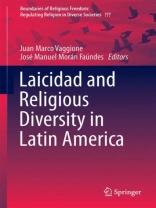This book presents revealing reflections on historical, socio-political, and legal aspects, as well as their contexts, in Argentina, Bolivia, Colombia, Costa Rica, Ecuador, Mexico, and Peru. Further, it includes theoretical and empirical analyses that identify the connections between religion and politics that characterize Latin American countries in general.
The individual chapters are based on a dialogue between regional and international approaches, renewing them and taking them to their limits by incorporating the Latin American experience. The book reflects the current intensification of research on religion in Latin America, the resulting reassessment of previous approaches, and the strengthening of empirical studies. It provides vital insight into the ways in which politics regulates the religious sphere, as well as how religion modulates and intervenes in politics in Latin America. In doing so it builds a bridge between the findings of researchers in the region on the one hand and the English-speaking academic public on the other, contributing to a dialogue that enriches comparative perspectives.
Inhoudsopgave
1 Laicidad and religious diversity: themes in the debates on the regulation of religion in Latin America(Juan Marco Vaggione and José Manuel Morán Faúndes).- 2 Laicism: Exclusive or Inclusive?(Faviola Rivera Castro).- 3 Evangelicals within Contemporary Argentinean Politics: Logics and Political Actors around Sexual and Reproductive Rights( Daniel Eduardo Jones, Marcos Andrés Carbonelli and Santiago Luján Cunial).- 4 The Problem of the Plaza: Religious Freedom, Disestablishment and the Catholic Church in Latin America’s Public Square (Julieta Lemaitre).- 5 ‘It Takes Two to Tango’: The Religious and the Secular in Argentina’s Political Dance, 1860–1960 (Gustavo Morello).- 6 Poverty, Sexuality, and Human Rights: Pluralism or Hegemony? Discourse of the Peruvian Catholic Church on LGBT Human Rights within the City of Lima (Martín Jaime).- 7 Radiography of a Confessional State: The Religious Spectrum in Costa Rica (Laura Fuentes Belgrave).- 8 Laïcités in the Andean Sub-region. Laïcité, sexuality and reproduction in Bolivia and Ecuador’s constituent debates (Marco Huaco Palomino).- 9 Religious actors and discourses in the public sphere: controversies around sexual education in Argentina (Juan Cruz Esquivel).
Over de auteur
Juan Marco Vaggione: Ph.D. in Sociology, New School for Social Research and Doctorate in Law and Social Sciences, National University of Cordoba. Independent Researcher of the National Council of Scientific and Technical Research (CONICET-Argentina). Professor of Sociology of Law at the National University of Córdoba. His publications deal with sexual rights and the relation between religion and sexual politics in Latin America.
José Manuel Morán Faúndes: Ph.D. in Latin American Social Studies, National University of Córdoba. Post-doctoral fellow of the National Council of Scientific and Technical Research (CONICET-Argentina), Law and Social Research Centre. Professor of Sociology of Law at the National University of Córdoba. He studies the relationships between religious conservatism, sexual politics and neoliberalism and Latin America, with emphasis on biopolitical approaches.












